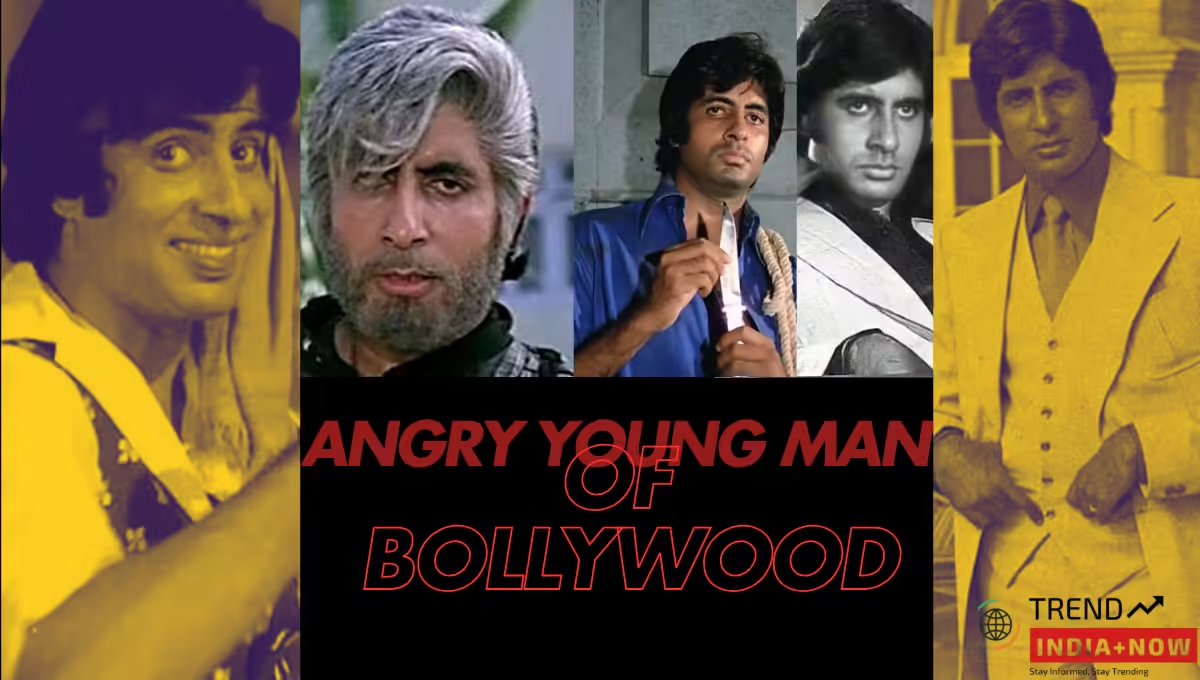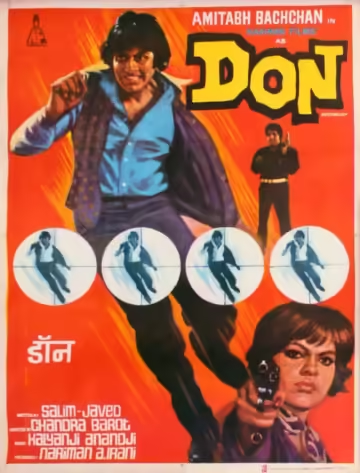
When we think of Amitabh Bachchan, we think of a superstar who forever changed the face of Bollywood. But what truly set him apart wasn’t just his acting prowess—it was his creation of a new kind of hero: the angry young man. In the 1970s, Bachchan’s portrayal of characters who defied the rules fought for justice, and embodied raw emotion gave Indian cinema a revolutionary new archetype—the Angry Young Man.
Article Highlights
Even contemporary actors like Ranveer Singh, in Gully Boy, have taken on roles where their characters walk the thin line between right and wrong—much like the angry young man did decades earlier.
Breaking the Rules: The Angry Young Man is Born
Before Amitabh Bachchan’s rise, Bollywood heroes were generally flawless, moral characters who followed the rules and never questioned authority. However, Bachchan’s roles in films like Zanjeer (1973) shattered that mould. As Vijay, he wasn’t afraid to break the law to seek justice. His anger wasn’t unfounded; it was a direct response to societal issues like poverty and corruption, making the character relatable to the audience.
In Deewar (1975), Bachchan took the angry young man persona to new heights. His character, Vijay, wasn’t just angry—he was battling a system that had failed him. While he turned to crime, his famous line, “Mere paas maa hai” (I have my mother), showed that even in his rebellion, he was driven by love and loyalty. This deep complexity made the angry young man more than just a rebel; he was a symbol of the common man’s frustration with societal injustice.
Complex Characters with Real Emotions
What made Amitabh Bachchan’s role captivating was his depth of emotion. He wasn’t simply a hero lashing out at the world—his anger stemmed from real-life struggles, ones that many Indians of the 1970s were facing. High unemployment, political unrest, and poverty were rampant, and Bachchan’s portrayal of the angry young man resonated with those who felt voiceless.

In Sholay (1975), Bachchan played Jai, a criminal with a code of ethics. Even though he operated outside the law, his actions were guided by principles. As an angry young man, Jai wasn’t impulsive—he was cool, calculating, and determined. This blend of control and inner turmoil made the character both mysterious and relatable, further cementing the angry young man archetype in Bollywood.
Why Audiences Fell in Love with the Angry Young Man
Amitabh Bachchan’s roles struck a chord with audiences because they were raw, real, and flawed. Unlike the traditional Bollywood hero, who always did the right thing, the angry young man was willing to break rules for a cause. This was a hero who wasn’t perfect, who made mistakes, but who had a strong moral compass despite his flaws.
Films like Deewar and Sholay are celebrated not just for their action-packed sequences but for the depth they brought to Indian cinema’s heroes.
In Deewar, Vijay’s criminal path wasn’t one of greed—it was a desperate attempt to rise above poverty and reclaim his dignity. His anger was directed at the injustice of a system that left him no other option. This internal conflict is what made the angry young man a beloved figure. Audiences could see themselves in his struggles, even if they didn’t agree with all his choices.
Impact on Indian Cinema
Amitabh Bachchan’s roles didn’t just redefine his career; they revolutionized Indian cinema. Before him, the distinction between heroes and villains in Bollywood was clear-cut. However, he introduced a new dimension to storytelling—where the hero wasn’t always righteous, and the villain wasn’t purely evil. These characters operated in shades of grey, and it was this complexity that made them so compelling.
Also read: Border (1997): Bollywood’s Most Iconic War Film About the Indo-Pak Conflict
Bachchan’s success as the angry young man also paved the way for future stars. Shah Rukh Khan’s anti-hero roles in Baazigar and Darr owe much to the legacy Bachchan created. Even contemporary actors like Ranveer Singh, in Gully Boy, have taken on roles where their characters walk the thin line between right and wrong—much like the angry young man did decades earlier.
The Legacy of the Angry Young Man
Even today, Amitabh Bachchan’s portrayal of the angry young man remains iconic. Films like Deewar and Sholay are celebrated not just for their action-packed sequences but for the depth they brought to Indian cinema’s heroes. The angry young man wasn’t just a symbol of rebellion; he was a voice for the marginalized, for those who felt let down by society but refused to accept their fate.
Bachchan’s roles weren’t just about anger—they were about fighting for justice, often at great personal cost. This made the angry young man more than just a cinematic trope; he became a symbol of resilience, a beacon of hope for audiences who needed to believe that standing up against injustice was possible, even if it meant breaking the rules.
The Man Who Gave Us More Than Just a Hero
Amitabh Bachchan’s angry young man is more than just a character; he represents a shift in Indian cinema’s understanding of heroism. He wasn’t the traditional hero who saved the day by following the rules. Instead, he questioned those rules, especially when they were unfair, and wasn’t afraid to take matters into his own hands. This is what made the angry young man so special—he was fighting not just for himself but for a larger cause, for justice, for equality.
Bachchan’s legacy as the angry young man lives on, not only in the films he made but in the countless actors and characters he inspired. His portrayal of flawed, complex heroes changed Bollywood forever, and his impact on Indian cinema continues to be felt even today.
If you found this interesting, you may also like